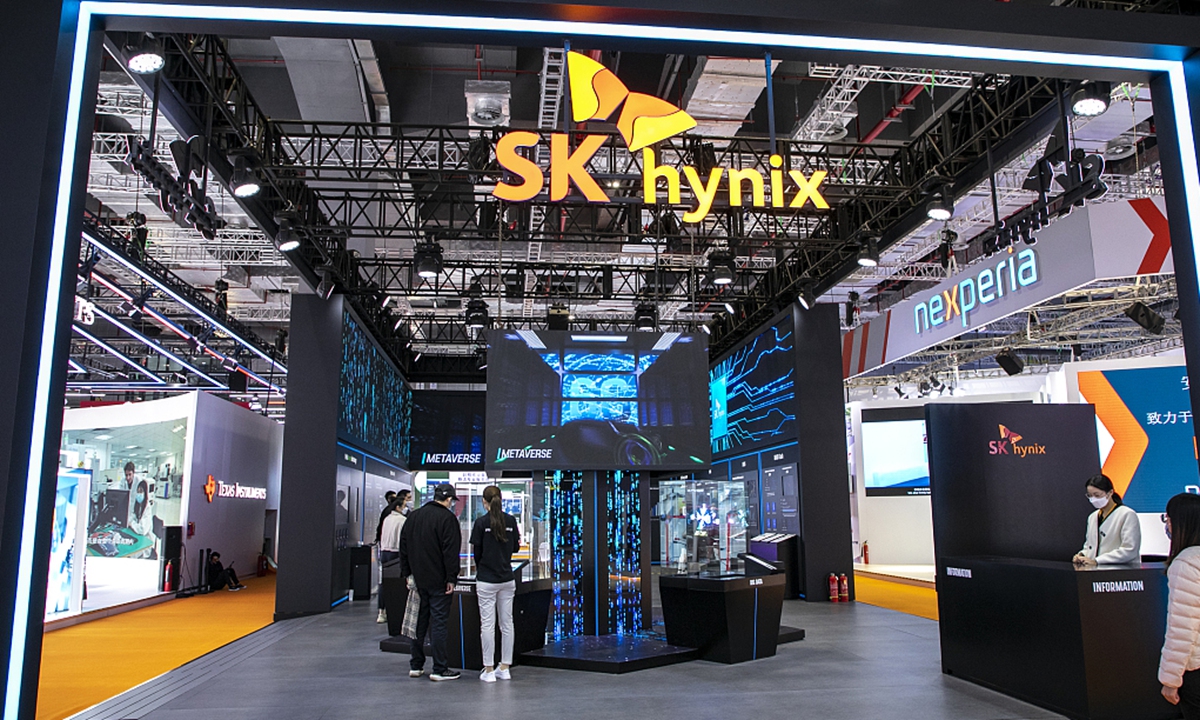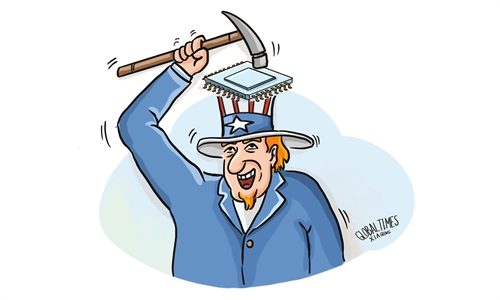Global chip firms fret over US chip ban amid falling sales, sever disruptions
Frustration grows amid falling sales, sever disruptions

SK Hynix. Photo: CFP
Global chipmakers are increasingly frustrated over the US' chip ban on China, which could lead to plunging sales, shrinking investment plans and growing concerns for the future operations, with chip giants, including South Korean chip giant SK Hynix, calling for exemptions from the US' crackdown move.
The intensifying US decoupling push with new chip export restrictions will further damage the highly globalized chip supply chain, which is already under pressure from sluggish demand, Chinese experts said on Wednesday.
SK Hynix said on Wednesday that it hopes there will be a one-year extension of its one-year waiver on chip equipment exports to China to maintain its fab operations in China amid a sales slowdown.
"Assuming that the waiver is not granted anymore, meaning that if it comes to a situation where we have to receive tool-by-tool licenses… this would create a very difficult situation for us to bring in the equipment," SK Hynix Chief Marketing Officer Kevin Noh said in a conference call for third-quarter results.
SK Hynix's third-quarter sales fell 20.5 percent and operating profits decreased 60.5 percent quarter-on-quarter due to sluggish demand for DRAM and NAND products amid worsening a macro-economic environment worldwide.
SK Hynix was authorized by the US Department of Commerce to continue receiving chip equipment needed for its chip production facilities in China for one year, without the need for additional licensing requirements.
SK Hynix's fab in Wuxi, East China's Jiangsu Province makes about half of SK Hynix's DRAM chips, Reuters reported.
The US government announced a broad set of technology export controls in early October, including the ban on shipments to China of certain semiconductor chips made anywhere in the world with US equipment.
The concerns raised by SK Hynix underline the difficulties facing global chip enterprises due to sluggish demand, exacerbated by the US' export restrictions, which can shake the whole industry, experts said.
The conference call revealed the difficulties and the dilemma facing chip enterprises following the US' move, Ma Jiahua, a veteran telecom observer, told the Global Times on Wednesday.
"The Chinese mainland is one of the largest chip markets, and it is inevitable for companies like SK Hynix to build factories near their markets. However, the restrictions of the US government have affected the normal operations of the entire market, leaving companies in a quandary over whether to continue investing," Ma said.
SK Hynix said it plans to reduce its investment next year by more than 50 percent year-on-year due to sluggish market demand.
"The chip industry is like a big building block, so if the US pulls China out of the layer by force it will most likely lead to the collapse of the whole block," Ma said.
Other companies on the industry chain, including those from the US, also face the consequences of the US' draconian moves.
ASM International said on Tuesday it expects the new US export restrictions to weigh heavily on its sales in China, as it reported third-quarter revenue.
"Our equipment sales in China, at 16 percent of our total revenue in the first nine months of 2022, have been a growing part of our business with a strong contribution to group profitability," the company said in a statement.
According to ASMI, the restrictions will affect more than 40 percent of its sales in China.
Meanwhile, shares of Taiwan Semiconductor Manufacturing Co plunged for two consecutive days after the company on Monday sent an internal letter to encourage employees to take more vacation, which was interpreted by the market as a negative message.
The US export restrictions are gradually taking a toll on chip companies and equipment makers around the world, Xiang Ligang, an independent technology analyst, told the Global Times on Wednesday.
The chaos in the global chip industry is likely to continue, and sanctions are unlikely to produce the results that the US wanted, Xiang said.
"The US intended to hit Chinese companies, but it ended up dragging down the whole industry, including its own chip manufacturers," Xiang said.
The impact on Chinese enterprises is so far limited, as the uncertainty created by the US sanctions has fueled market demand for Chinese chipmaking companies for security reasons, Xiang noted.
"China has an irreplaceable position on this industry chain. China is the largest market for semiconductor equipment, with sufficient talent and capital investment. It is only a matter of time before it makes technology breakthroughs," he said.



